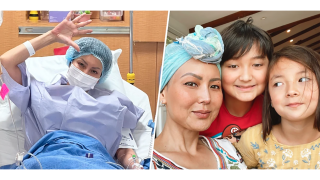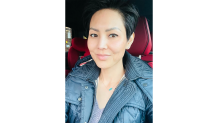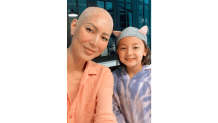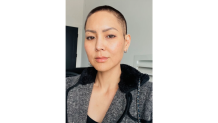
For more than two years, Camilla Row kept telling her doctors about heartburn-like pain that wouldn’t go away.
She tried every lifestyle change they recommended — cutting out coffee, avoiding spicy and salty food, sleeping on an incline pillow — but nothing worked.
WATCH ANYTIME FOR FREE
Stream NBC10 Boston news for free, 24/7, wherever you are. |
The gastroenterologists she consulted just told her to keep taking medication that reduced stomach acid. She was a young mom in her 30s and otherwise healthy, so none of the specialists took a deeper look, she says.

Get updates on what's happening in Boston to your inbox. Sign up for our News Headlines newsletter.
The pain got so severe that Row feared she was having heart attacks. She still remembers pleading with her primary care physician to help her.
“I was actually crying. I’m like, ‘This hurts so bad, please don’t send me home,’” Row, who lives in Studio City, California, and is now 45, tells TODAY.com.
A doctor finally scheduled an endoscopy, which revealed the true diagnosis: Stomach cancer.
U.S. & World
“The first question I asked was: You can get cancer of the stomach?” she recalls. “I knew nothing about it.”
The ordeal would ultimately lead to the removal of not only her stomach, but her ovaries and breasts as well.
Stomach cancer symptoms
Row was especially stunned because before her symptoms began in 2015, she considered herself very healthy.
She ate well and exercised several times a week — she met her husband, actor Brennan Elliott, at a gym. She has no family history of stomach cancer.

After she was diagnosed with gastric adenocarcinoma in 2018, her entire stomach and 47 lymph nodes were removed. Two lymph nodes close to her stomach came back positive for cancer, meaning Row was stage 1.
She underwent chemotherapy and had her esophagus connected to her small intestine. She had to relearn how to eat and digest without a stomach, which meant pureed food, small portions and lots of chewing.
Row is frustrated it took two and a half years to be diagnosed.
It’s a familiar scenario, says Dr. Yanghee Woo, a surgical oncologist and gastric cancer specialist at City of Hope in California, who is treating Row.
Stomach cancer symptoms are vague and the disease is rare in the U.S. — making up about 1.5% of all new cancers diagnosed — which leads to a “lack of suspicion from the medical profession” when patients have warning signs, she notes.
Country singer Toby Keith died of stomach cancer on Feb. 5, 2024, two years after his diagnosis.

Woo says symptoms include:
- Nausea
- Discomfort after eating
- Bloating
- Unintended weight loss
- Early satiety — or feeling full quickly after eating just a little food
- Abdominal pain
- Decreased appetite
- Persistent bad acid reflux
- Dark stool
The early stages of stomach cancer often produce no symptoms at all and don’t show up on scans, the oncologist notes.
“Stomach cancer can hide very well. It’s not very distinct unless it gets very big,” Woo tells TODAY.com.
All of those factors mean at least 80% of stomach patients in the U.S. are already in the advanced stages of the disease when they’re diagnosed, she says. Diagnosis generally requires an upper endoscopy and biopsy.
What causes stomach cancer?
A bacterial infection, the food a person eats and genetic mutations can lead to the disease.
Ethnicity is also a risk factor: In the U.S., stomach cancer is more common in Asian, Hispanic, Black and Native Americans, the American Cancer Society notes.
A major cause is infection with H. pylori bacteria. It’s the same bug that causes stomach ulcers and may spread through contaminated food and water, or through contact with an infected person’s body fluids.
The bacteria goes into the stomach lining and changes it, causing inflammation, Woo says.
A very high salt diet is another risk factor, as is eating lots of charred, smoked and preserved foods, she adds.
About 3% of patients have a genetic predisposition for stomach cancer, Woo notes.
Genetic testing showed Row has a mutation in the CDH1 gene. Stomach cancer associated with such mutations is aggressive and can progress quickly, Woo says.
The same mutation increases the risk of breast cancer, so when a breast MRI and biopsy in 2021 showed Row had atypical hyperplasia, the step right before breast cancer, and she decided to have a double mastectomy to prevent any disease there.
But the ordeal wasn’t over yet.
Stomach cancer returns in ovaries
To monitor for any recurrence of cancer, Row had CT scans every six months. She also took a blood test that looks for circulating tumor DNA. In 2021, that test came back positive.
Doctors found tumors on her ovaries that were of gastric cancer origin even though she didn’t have a stomach anymore. They told her the cancer cells can “sleep, hide and reactivate,” she says.
Row underwent surgery to remove her ovaries and fallopian tubes. She was now a stage 4 stomach cancer patient facing some daunting statistics.
“I’ve actually just surpassed my expiration date because when I was first diagnosed (with stage 4 cancer), the longest prognosis I got was 24 months. So to be here and say I’m still here, I’m still doing extremely well,” Row says.
She attributes part of that success to a treatment she describes as a “hot chemo wash.” Officially known as hyperthermic intraperitoneal chemoperfusion, it delivers chemotherapy that’s heated to 107 degrees Fahrenheit straight into the belly, where it’s swirled around to target cancer cells, Woo says.

The heated chemo penetrates the lining of the abdomen better while having fewer side effects than systemic chemo injected into the vein, Woo adds.
Row has now undergone seven such procedures, each requiring general anesthesia, and continues to receive traditional chemotherapy.
She has no evidence of disease on scans, but has microscopic levels of circulating tumor in her blood. Her outlook is guarded but very bright, Woo says.
Row, who is a clinical psychologist, says she is trying to keep a very positive mindset, and living a normal life with her husband and kids. She stays busy by raising awareness about stomach cancer and advocating for other patients.
“If I have limited time, I’m going to make my time worth it and count,” Row says. “Knowing that I can make a difference really helps me feel like my disease is not in vain.”
This story first appeared on TODAY.com. More from TODAY:



